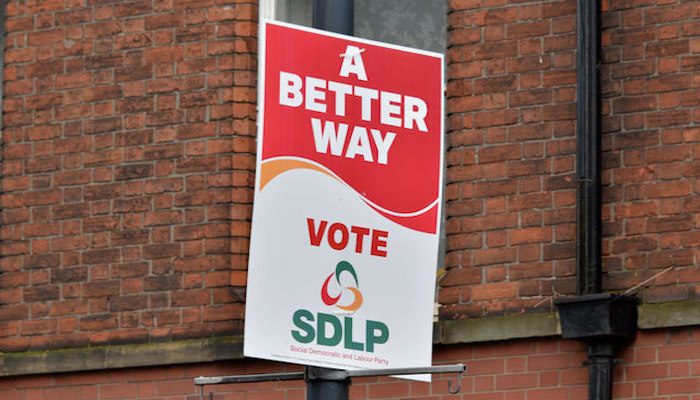
Once heralded around the world as the vanguard movement for peace and civil equality in Northern Ireland, Northern Ireland’s Social Democratic & Labour party now finds itself eclipsed by its rival Sinn Féin and verging on the point of political extinction. By their own admission, in the years since the culmination of their flagship achievement, the Good Friday Agreement, the SDLP has lost its ‘message’ and its electoral performance in Northern Ireland’s nationalist community has declined sharply from 70% in the 1990s to well under 30% today. Since the retirement of party founder and Nobel Peace Prize laureate John Hume in 2001, the party has gone through several leaders and lost its entire representation in both the European and British parliaments. In the years since Hume’s departure, they have struggled to find a role in a post-civil rights, post-peace process era of Northern Irish politics and have had their share of seats in the Stormont Assembly drop from twenty-four in 1998 to just twelve in 2017.
Another contemporary account of the SDLP decline tends to focus on the party losing its place as the voice of the nationalist community due to the anomalous rise of Sinn Féin in the post-Good Friday Agreement era. The legitimization of Sinn Féin and their ability to become an effective electoral force does partially explain the decline of the SDLP. The disputed narrative on how Northern Ireland’s troubles ended can be seen as preventing two parties with similar economic positions, fighting over the same voters, from making the normal pragmatic considerations one would expect from parties seeking to maximize electoral performance.
This has culminated in the SDLP’s political strategy being stuck in a state of paralysis over the legacy of the troubles, and unable to stem the flow of voters who drift to Sinn Féin. While the SDLP continue their unhealthy fixation on their role bringing various parties to peace in the past, Sinn Féin increasingly is seen as a more effective communicator of nationalist interests post-conflict. Losing Hume’s European Parliament seat to Sinn Féin in 2004 was the direct result of this lack of attention on bread and butter nationalist concerns.
Fifteen years of steady decline and the challenges of Brexit has lead to their recent decision to enter a formal policy pact with the Irish nationalist Fianna Fail. It points to an admission they cannot continue operating as an independent entity in this time of crisis nationally and internally. The pact with Fianna Fail appears to be a slight climb down from full, official incorporation into the Fianna Fail party structure which was reported in the media in late 2018. However, it now presents an unexpected headache for the party ahead of the impending 2019 European Parliamentary elections. Of Northern Ireland’s major political parties only the SDLP have remained static in their support of European integration and their membership of the Party of European Socialists (PES) in the European Parliament. The new problem this new pact presents is Fianna Fail’s prominent membership of the Alliance of Liberals and Democrats for Europe (ALDE).
The splintering of the SDLP’s European message is further complicated as their leader who championed this pact, Colum Eastwood, has taken the surprising step of putting himself forward as the SDLP/PES candidate in the three seat Northern Ireland constituency. The steady decline of the moderate Ulster Unionist Party (UUP) at the expense of the Democratic Unionist Party (DUP) and the closing of the gap between the Nationalist and Unionist electorates as a whole means Northern Ireland’s third European seat will likely be a toss-up between the UUP and Eastwood. Meanwhile, the Northern Irish Alliance Party will field their leader Naomi Long under the ALDE banner.
Should Eastwood take a seat it would present an awkward headache for him in the EP party grouping system, and one that has not gone unnoticed by PES who openly called for SDLP delegates to reject the policy pact with Fianna Fail. Within a few days of the announcement of the pact, Mark Durcan, a former leader of the SDLP, declared his intention to contest the European elections south of the border for Fine Gael, a member of the European People’s Party (EPP), to act as a proxy candidate for Northern Ireland.
The unanticipated divisions of Brexit have hastened the SDLP into a situation where their once consistent message on Europe is rupturing. European party groups have long been criticized as Brussels-centric with little or no bearing on the national elections which return MEPs. However, they are a vital mechanism in the Brussels policy machine as they structure multi-national voter choices and party preferences into coherent political units.
Come June, the SDLP’s incoherency will be put to the test in another unanticipated Brexit fallout. The spillover effect from the 2016 referendum will potentially come straight to the European Parliament door through Eastwood and Durcan’s conflicting allegiances. They will be joined by Nigel Farage’s Brexit Party and possibly, new configurations of Labour and Tory MEPs with conflicting mandates to their national parties. Brexit and Northern Ireland’s new atypical allegiances are well and truly coming home.
Further Reading on E-International Relations
- Opinion – Brexit and the Continued Troubles in Northern Ireland
- Understanding Sinn Féin’s Abstention from the UK Parliament
- Opinion – Brexit and Its Many Identities in the UK
- Brexit and the 2019 European Elections
- Brexit Endgame: The 2019 UK Election
- Twenty-Five Years On: Northern Ireland’s Good Friday Agreement